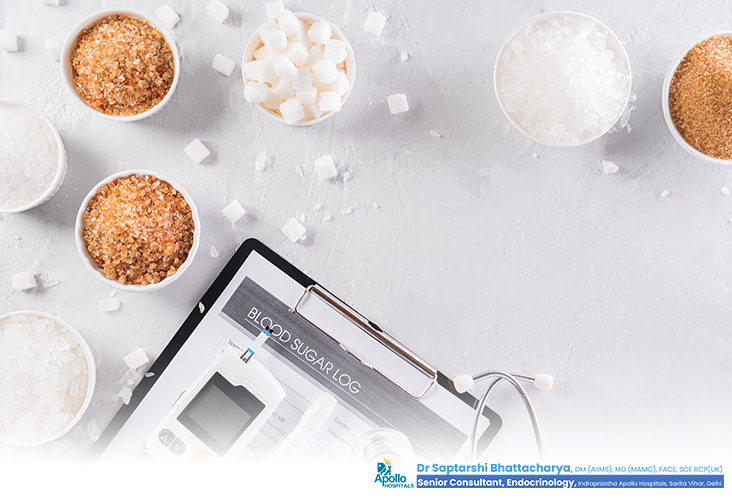Dr. Saptarshi Bhattacharya
Diabetes is a common disease characterized by high blood glucose (the principal form of sugar in blood). We are often inundated with myths about this serious condition. The common misconceptions that get in the way of management of diabetes has been discussed here.
Myth 1 # I do not need to worry about diabetes since I do not have symptoms
Fact: Symptoms of diabetes occur in two situations. One if the blood glucose is very high. High blood sugar can cause increased urination, thirst and appetite along with weight loss, genital infection, delayed wound healing, etc. The second group of symptoms occur from complications of diabetes. A mild to moderate rise in blood sugar may not cause any overt symptoms (mentioned above) but can present suddenly after a few years with heart disorder (e.g. heart attack or angina), kidney problems (swelling and decreased urine output), blindness, stroke, gangrene and nerve damage to name a few. So if you are waiting for your diabetes to cause symptoms and then start treatment it might already be too late and vital organs might have already suffered damage.
Myth 2 # I have just a touch of diabetes so I need not worry
Fact: Either you have it or you don’t. Fasting blood glucose readings over 126 mg/dL; blood glucose more than 200 mg/dL after 2 hours following a 75 gm oral glucose load; random blood glucose over 200 mg/dL along with symptoms like increased urination, thirst or appetite; or an A1C (HbA1c) of 6.5 % or higher are all considered diabetes. If the results are borderline the tests has to be repeated on another day. If the diagnosis is confirmed, lifestyle changes and medication (in many cases) has to be initiated. Blood glucose more than normal but not so high as to be labelled as diabetes, is termed as prediabetes and warrant lifestyle modification. Both diabetes and prediabetes should be taken seriously.
Myth 3 # If I get diabetes, I want to use the insulin pill instead of injection
Fact: Insulin as of now is available only in injectable form. The insulin delivery devices are syringe, pen and insulin pump (an advanced form of insulin delivery system). An inhaled form of insulin was available in the market a few years back but has now been withdrawn due to side effects on lungs. Oral forms of insulin are in very early phase of development and are undergoing animal trial. It is very unlikely that insulin tablets will be commercially available in next 5 to 10 years. The currently used oral medicines for diabetes do not contain insulin but some of them do act by stimulating insulin secretion from pancreas.
Myth 4 # If I use insulin once, I will always have to use insulin
Type 1 diabetes mellitus, the form of diabetes that occurs in younger age (usually less than 25 years), is treated by insulin and only insulin. Insulin is essential for life and vitality in such persons. Type 2 diabetes, the more common variety, that occur in adults can be treated by both oral medicines and insulin. Doctors often prescribe insulin in persons with type 2 diabetes in the setting of surgery, infection, hospitalization or when the blood glucose is very high. In such situations insulin can be safely stopped and oral medications restarted when the acute crisis is over. However, in some persons with long standing type 2 diabetes, oral medications alone cease to be effective and insulin might be required for control of diabetes on a regular basis.
Myth 5 # Metformin and oral medications for diabetes can damage kidney
None of the oral medications that are used for treatment of diabetes has any adverse effect on kidney. Numerous clinical trials and studies all across the world have confirmed it. The two major contributors to kidney damage are in fact high blood sugar and high blood pressure. Some of the medicines for diabetes should be used with caution when the kidney function starts getting deranged (marked by an increase in serum creatinine) to avoid certain side effects. Most doctors prefer insulin in such situations. Some oral medications can cause prolonged hypoglycemia (low blood glucose) in setting of kidney disease due to decreased clearance of these drugs through kidney and hence should be used with caution.

